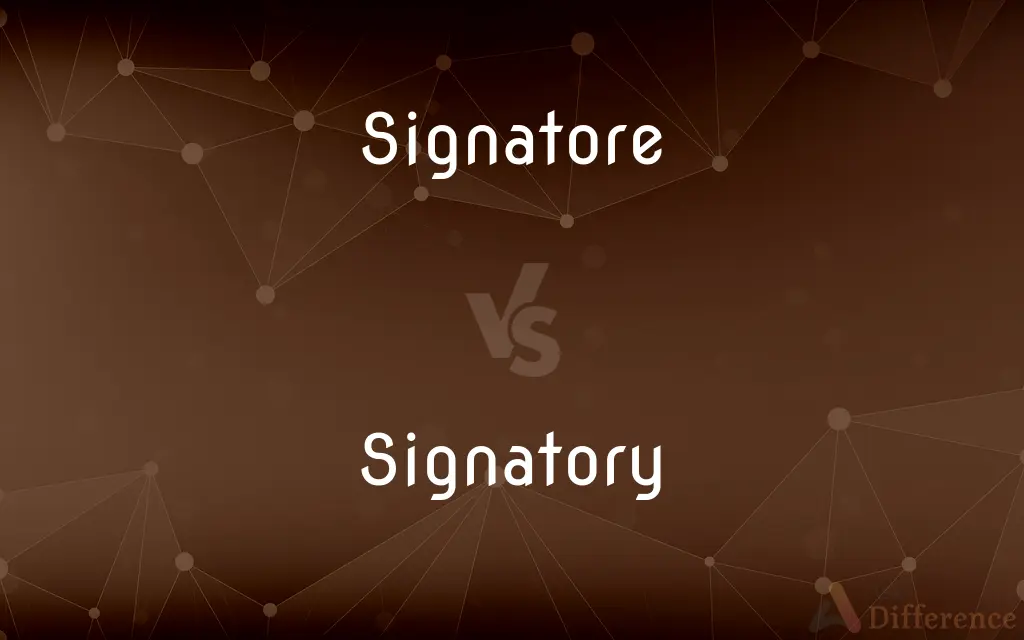Signatore vs. Signatory — Which is Correct Spelling?
Edited by Tayyaba Rehman — By Fiza Rafique — Updated on March 19, 2024
Signatore is the incorrect spelling. Signatory is the correct spelling and refers to a party that has signed an agreement.

Table of Contents
Which is correct: Signatore or Signatory
How to spell Signatory?

Signatore
Incorrect Spelling

Signatory
Correct Spelling
ADVERTISEMENT
Key Differences
Recall "signature," which is close in spelling to signatory but not signatore.
Remember the phrase: "A signatory tells a story of agreement."
Avoid the trap of "orate" sound; it's "atory" not "atore."
The word signatory relates to signing, so remember the root "sign" followed by "atory."
The word "story" has the sound "tory," which can be found in signatory.
ADVERTISEMENT
How Do You Spell Signatory Correctly?
Incorrect: The document was missing a signatore.
Correct: The document was missing a signatory.
Incorrect: Each signatore must verify their identity.
Correct: Each signatory must verify their identity.
Incorrect: He was the last signatore to sign the agreement.
Correct: He was the last signatory to sign the agreement.
Incorrect: The contract requires at least one signatore.
Correct: The contract requires at least one signatory.
Incorrect: She became a signatore of the treaty.
Correct: She became a signatory of the treaty.
Signatory Definitions
Signatory refers to a nation that has signed, but not ratified, a treaty.
Though a signatory, the country hadn't ratified the pact.
Signatory is a person or entity that has signed a formal document.
The president was a signatory to the international treaty.
Signatory denotes a party bound by the terms of a legal agreement due to signing it.
Multiple signatories were involved in the peace accord.
Signatory can be an individual who signs as a witness.
He acted as the signatory for her will.
Signatory represents the act or process of signing a document.
As a signatory, she officially joined the organization.
A party that has signed an agreement, especially a state that has signed a treaty
The signatory states
Britain is a signatory to the convention
Bound by signed agreement
The signatory parties to a contract.
One who has signed a contract or other legal document as a party.
A country that is a party to a treaty.
One who signs or has signed something.
Relating to a seal; used in sealing.
Signing; joining or sharing in a signature.
Signatory powers
Signing; joining or sharing in a signature; as, signatory powers.
A signer; one who signs or subscribes; as, a conference of signatories.
Someone who signs and is bound by a document
Signatory Meaning in a Sentence
As a signatory, she had the authority to make decisions.
Each signatory provided their signature in ink.
The signatory of the contract had many responsibilities.
The signatory countries met to discuss further actions.
Being a signatory to such an agreement was a serious commitment.
He was proud to be a signatory on the historic document.
She was the first signatory to arrive at the meeting.
Each signatory had a copy of the agreement for their records.
Being a signatory brought certain obligations and benefits.
She reviewed the responsibilities of a signatory before signing.
As a signatory, his role was to ensure compliance with the terms.
The signatory nations pledged to reduce emissions.
He meticulously reviewed the document before becoming a signatory.
The signatory had doubts but ultimately agreed to the terms.
A signatory to the charter, she helped shape its direction.
The signatory parties met annually to review progress.
Signatory Idioms & Phrases
Signatory status
The condition or fact of being a signer to an agreement or treaty.
The organization gained signatory status, allowing it to participate in negotiations.
Withdrawal of a signatory
The process by which a signatory removes itself and its obligations from an agreement or treaty.
The withdrawal of a signatory from the agreement raised questions about its future effectiveness.
To become a signatory
The act of signing and thus agreeing to the terms set forth in a document or treaty.
The country expressed its intention to become a signatory to the international accord.
Signatory obligations
The duties and responsibilities a signatory is bound to perform under an agreement.
Meeting the signatory obligations required careful planning and resources.
Non-signatory
An entity that has not signed a particular treaty or agreement.
Non-signatory states were not obligated by the treaty's terms but were encouraged to comply voluntarily.
Signatory power
The authority or capacity of an entity to sign an agreement or treaty, making it legally binding.
As a signatory power, the country played a crucial role in the treaty's effectiveness.
Signatory rights
The rights that a signatory acquires by signing an agreement or treaty.
The signatory rights included in the agreement allowed for increased trade between the nations.
Major signatory
A particularly influential or important party that has signed an agreement or treaty.
As a major signatory, their withdrawal could jeopardize the entire agreement.
Signatory ceremony
A formal event during which an agreement or treaty is signed by the parties involved.
The signatory ceremony was attended by diplomats from around the world.
Lone signatory
The only party to sign a document, especially when others are expected or required to sign.
As the lone signatory, she held sole responsibility for executing the plan.
Honorary signatory
An individual who signs a document in a symbolic role, without the intention of creating legal obligations.
The honorary signatory added prestige to the campaign.
Lead signatory
The first or most prominent party to sign an agreement, often taking a lead role in its implementation.
The lead signatory spearheaded the initiative for broader participation.
Signatory nation
A country that has signed an international treaty or agreement.
Signatory nations to the climate accord committed to reducing their carbon emissions.
Signatory witness
A person who observes the signing of a document and signs it themselves to confirm this action.
The signatory witness provided additional legal weight to the document.
Principal signatory
The main party involved in an agreement, often holding significant authority or responsibility.
The principal signatory had the final say in amendments to the contract.
Original signatory
An entity or individual who was among the first to sign an agreement, often having a foundational role.
The original signatories to the charter became leading members of the organization.
Add a signatory
To include an additional party as a signer to an existing agreement or document.
The partners agreed to add a signatory to the business agreement.
Common Curiosities
What is the root word of Signatory?
The root word is "sign."
Why is it called Signatory?
It is called signatory because it pertains to someone or something that signs or has signed a document.
What is the pronunciation of Signatory?
It is pronounced as /ˈsɪɡ.nəˌtɛri/.
What is the verb form of Signatory?
The verb form related to signatory is "sign."
What is the singular form of Signatory?
The singular form is "signatory."
Which preposition is used with Signatory?
The preposition "of" is often used with signatory (as in "signatory of the treaty").
Which vowel is used before Signatory?
The vowel "a" is used before signatory.
What is the plural form of Signatory?
The plural form is "signatories."
Is Signatory a negative or positive word?
Neutral; it describes a fact of having signed.
Is Signatory a vowel or consonant?
Signatory is a word, not a single letter. It contains both vowels and consonants.
Which conjunction is used with Signatory?
Any conjunction can be used with signatory depending on the sentence context, such as "and" or "but."
Is the Signatory term a metaphor?
No, but it can be used metaphorically in some contexts.
How many syllables are in Signatory?
There are four syllables in signatory.
Which article is used with Signatory?
Both definite ("the") and indefinite ("a" or "an") articles can be used with signatory depending on the context.
Is Signatory a noun or adjective?
Signatory can be both a noun and an adjective depending on its usage.
Is Signatory a countable noun?
Yes, you can have one signatory or multiple signatories.
What is the stressed syllable in Signatory?
The first syllable, "sig," is stressed.
What part of speech is Signatory?
Signatory can be both a noun and an adjective.
Which determiner is used with Signatory?
Any determiner like "this," "that," "my," or "a" can be used, depending on the context.
What is the first form of Signatory?
The first form (noun/adjective) is "signatory."
What is the second form of Signatory?
There isn't a second form as signatory itself isn't a verb.
Is Signatory an adverb?
No, signatory is not an adverb.
Is Signatory an abstract noun?
No, it's a concrete noun referring to a person or entity that signs.
Is Signatory a collective noun?
No, it's not a collective noun.
Is the word Signatory imperative?
No, signatory is not imperative.
Is the word “Signatory” a Direct object or an Indirect object?
It can be either depending on the sentence structure.
How do we divide Signatory into syllables?
It divides as sig-na-to-ry.
What is another term for Signatory?
Signer.
What is the third form of Signatory?
There isn't a third form as signatory itself isn't a verb.
How is Signatory used in a sentence?
"She became a signatory to the historic agreement."
Is the word Signatory a gerund?
No, it's not a gerund.
What is the opposite of Signatory?
There isn't a direct opposite, but "non-signatory" refers to someone who hasn't signed.
Share Your Discovery

Previous Comparison
Pitty vs. Pity
Next Comparison
Divet vs. DivotAuthor Spotlight
Written by
Fiza RafiqueFiza Rafique is a skilled content writer at AskDifference.com, where she meticulously refines and enhances written pieces. Drawing from her vast editorial expertise, Fiza ensures clarity, accuracy, and precision in every article. Passionate about language, she continually seeks to elevate the quality of content for readers worldwide.
Edited by
Tayyaba RehmanTayyaba Rehman is a distinguished writer, currently serving as a primary contributor to askdifference.com. As a researcher in semantics and etymology, Tayyaba's passion for the complexity of languages and their distinctions has found a perfect home on the platform. Tayyaba delves into the intricacies of language, distinguishing between commonly confused words and phrases, thereby providing clarity for readers worldwide.












































